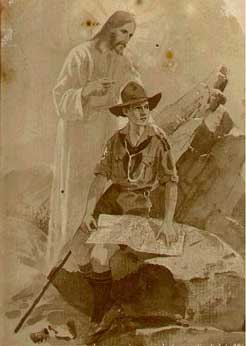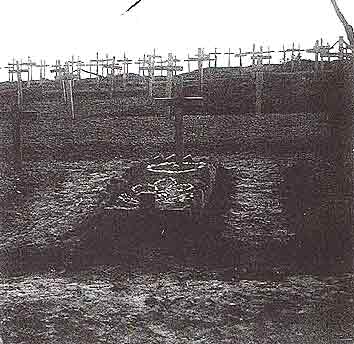
|
Killed in
Action
|
|||||||
The brigade to which the 9th Royal Fusiliers belonged was detailed to capture Ovillers, one of the strongly fortified villages in the original German first line of defense. While waiting for the signal to attack, the dug-out occupied by Captain Roland Philipps was struck by a shell and he was buried in the ruins. It was at first thought that he had been killed, but his men dug him out of the débris, fortunately unhurt. He got out just in time to lead his company in the assault. He had hardly gone over the parapet before he was wounded in the leg by shrapnel and knocked down. He rose again almost instantly and struggled on, only to fall again, this time shot through the head by a machine gun bullet.
Roland Philipps' death was an irreparable loss to the scout movement, for it deprived it of one who was an inspiration to his fellow workers and an incomparable guide to the successful leadership of lads. He set an example to all scout masters in the love and sympathy he had for boys whether rich or poor; in his keenness and energy in well-doing; in his power of persuasive speech; in his practical and whole-hearted faith in God; and his clear grasp of all that is meant by "scouting". Young in years, he infused into numbers of men and boys that scout spirit, which is the motive power of successful scout work. In testifying to the value of his services, Sir Robert Baden Powell observed that "Roland Philipps" little book, "The Patrol System", is the best possible monument that could be raised in our brotherhood to his memory; through it he will still live in our hearts, and his spirit will continue among us to help us in our work." He bequeathed his fine old house, No. 29 Stepney Green, called Roland House in his memory, to the Boy Scout Association, as its permanent headquarters in the East London District. He had intended to live there himself after the war, and in accordance with his wishes it was for a time the residence of the Commissioner, and the center of the organization which dealt with over four thousand boys, grouped in units called "patrols" and in higher formations called "troops". In the cellar of Roland House was its quaint little chapel, appropriately dedicate to St. Francis and the Troubadours. This humble shrine of chivalry was a fitting memorial to Roland Philipps, for it recalled the self-sacrificing idealism, inspired by the religious faith, which his life so nobly exemplified. In a niche, near the altar where many a Rover had knelt in vigil and dedicated himself to knightly service, could be seen his photograph, his sword, and a case containing his medals and Military Cross. Along with these personal relics was the plain wooden cross that marked his grave in the Aveluy cemetery. Over all burnt a little lamp symbol of remembrance and of abiding courage and constancy. In July, 1916, there began the terrifying bloodbath that we know as the Battle of the Somme and on July 7, near the village of Ovillers, Roland Philipps became another name on the seemingly endless list of those "killed in action". A witness described how only six or seven of the 220 men that Roland led into action that day survived unscathed, all the rest being killed or wounded. Mankind has not yet produced a more vivid impression of hell on earth than World War I. B-P described the loss of Roland Philipps as "an irreparable one to the boy scout movement." The scouts of East London were devastated, but Roland, in one of his letters, gave them a charge. "In my will," he wrote, "I have left them the freehold property in Stepney Green... you will use the place in whatever way will best help the boys, and I know that God will bless the work that is carried on there." |

